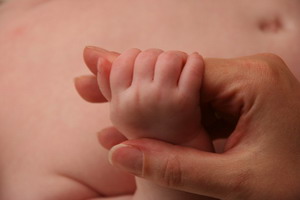 How is your grip? This is probably something you never think about unless you find you are unable to open a jar of peanut butter anymore. But grip strength is much more than just accessing delicious ground peanuts, a lot more. Your grip strength is an indicator of the strength of the muscles all over your body. It is a simple measure of the general degeneration of all sorts of biological systems as you age. As we age we get weaker. This is inevitable. But slowing the rate of decay is the point of living a healthy lifestyle. So what can we determine from checking our grip strength?
How is your grip? This is probably something you never think about unless you find you are unable to open a jar of peanut butter anymore. But grip strength is much more than just accessing delicious ground peanuts, a lot more. Your grip strength is an indicator of the strength of the muscles all over your body. It is a simple measure of the general degeneration of all sorts of biological systems as you age. As we age we get weaker. This is inevitable. But slowing the rate of decay is the point of living a healthy lifestyle. So what can we determine from checking our grip strength?
The first question we have to ask is what is our baseline? What is normal strength for our age?
| Age |
Male
left hand | right hand |
Female
left hand | right hand |
| 20–29 |
99 lbs | 103 lbs |
61 lbs | 66 lbs |
| 30–39 |
103 lbs | 103 lbs |
63 lbs | 68 lbs |
| 40–49 |
99 lbs | 103 lbs |
61 lbs | 63 lbs |
| 50–59 |
94 lbs | 99 lbs |
57 lbs | 61 lbs |
| 60–69 |
83 lbs | 88 lbs |
50 lbs | 52 lbs |
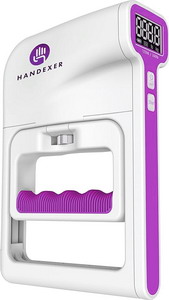 Okay, how do we measure our grip strength? In the office, I use a tool called a dynamometer. We take the average of three readings to establish your general strength. I also notice how the strength varies between the three readings. If the reading is generally the same or gradually increases then this is normal. But if the reading drops significantly with each squeeze then I suspect a neurological problem. If one side is much weaker than the other then I suspect nerve root issues in the neck on the weak side. If both sides are weak compared to the normals indicated above then I suspect early degenerative changes in the muscles or possibly some metabolic or endocrine problems. As you can see, grip strength decreases as we age, particularly after the age of 50. If you maintain your grip strength, it says you are aging more slowly.
Okay, how do we measure our grip strength? In the office, I use a tool called a dynamometer. We take the average of three readings to establish your general strength. I also notice how the strength varies between the three readings. If the reading is generally the same or gradually increases then this is normal. But if the reading drops significantly with each squeeze then I suspect a neurological problem. If one side is much weaker than the other then I suspect nerve root issues in the neck on the weak side. If both sides are weak compared to the normals indicated above then I suspect early degenerative changes in the muscles or possibly some metabolic or endocrine problems. As you can see, grip strength decreases as we age, particularly after the age of 50. If you maintain your grip strength, it says you are aging more slowly.
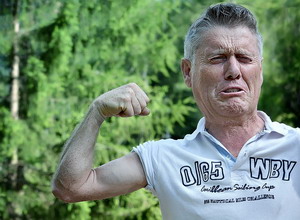 Why do we get weaker with age? There are several answers to this big question. Nutrition is a simple place to start. As we age, the energy-intense process of making the enzymes and hydrochloric acid our digestion needs to break down proteins into an amino acid form we can absorb becomes less efficient. Our ability to absorb the protein we eat gets less. Consequently, we have to eat more protein as we age to compensate somewhat for this. While a healthy 20 to 40-year-old may get by on only half a gram of protein per pound of body weight, as we get up into our 60s and beyond that number looks more like a whole gram of protein per pound of lean body weight we have. (You don’t count the extra pounds of fat you might be carrying.) Most people do not eat enough protein when they get older. If you are not getting enough protein in your diet then you can’t build muscle, which is made from protein. You can’t build muscle by eating sweets and starches. Salads just won’t cut it.
Why do we get weaker with age? There are several answers to this big question. Nutrition is a simple place to start. As we age, the energy-intense process of making the enzymes and hydrochloric acid our digestion needs to break down proteins into an amino acid form we can absorb becomes less efficient. Our ability to absorb the protein we eat gets less. Consequently, we have to eat more protein as we age to compensate somewhat for this. While a healthy 20 to 40-year-old may get by on only half a gram of protein per pound of body weight, as we get up into our 60s and beyond that number looks more like a whole gram of protein per pound of lean body weight we have. (You don’t count the extra pounds of fat you might be carrying.) Most people do not eat enough protein when they get older. If you are not getting enough protein in your diet then you can’t build muscle, which is made from protein. You can’t build muscle by eating sweets and starches. Salads just won’t cut it.
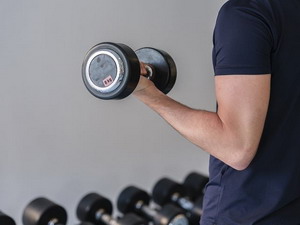 The second big factor is getting the exercise you need. Walking and aerobic exercise are good for the heart, but they do not build much muscle. To signal the body to build muscle, you have to try to make the muscles do more than they can presently do. Simply put that means weight training. You only need to do this 2 or 3 times a week for maybe half an hour, but it must be done. When I go to the gym there are usually half a dozen old codgers like me pumping iron. This includes ladies as well. Working out to my limit poops me out for a couple of hours, so I do this on my days off – Wednesday and Saturday. But many people avoid exercise precisely because it is tiring and our energy level isn’t what it used to be. But the hidden truth is that the way to build more energy is by using up the energy we have. Our bodies are minimum-effort participants. They do the minimum whenever possible. To get them to do more, we have to demand they do more. Giving in to the tiredness gradually makes us more tired.
The second big factor is getting the exercise you need. Walking and aerobic exercise are good for the heart, but they do not build much muscle. To signal the body to build muscle, you have to try to make the muscles do more than they can presently do. Simply put that means weight training. You only need to do this 2 or 3 times a week for maybe half an hour, but it must be done. When I go to the gym there are usually half a dozen old codgers like me pumping iron. This includes ladies as well. Working out to my limit poops me out for a couple of hours, so I do this on my days off – Wednesday and Saturday. But many people avoid exercise precisely because it is tiring and our energy level isn’t what it used to be. But the hidden truth is that the way to build more energy is by using up the energy we have. Our bodies are minimum-effort participants. They do the minimum whenever possible. To get them to do more, we have to demand they do more. Giving in to the tiredness gradually makes us more tired.
 Poor grip strength is shown in research to indicate poorer immune health. That means you are more vulnerable to getting sick and dying. Your immune system gets old just like the rest of the body. A good supply of muscle mass is vital to a strong immune system. This is the system that not only fights off colds and flu, but cancer and many systemic infectious processes. Lowered immune health also means you are more likely to get complications and do more poorly under care resulting in more hospital time. That muscle mass is also critical to keeping your blood sugar under control. Without that, you are wide open for heart disease, diabetes, and a host of other chronic diseases. Improving grip strength is a well-established way to lower your blood pressure thereby lowering your chance of a stroke.
Poor grip strength is shown in research to indicate poorer immune health. That means you are more vulnerable to getting sick and dying. Your immune system gets old just like the rest of the body. A good supply of muscle mass is vital to a strong immune system. This is the system that not only fights off colds and flu, but cancer and many systemic infectious processes. Lowered immune health also means you are more likely to get complications and do more poorly under care resulting in more hospital time. That muscle mass is also critical to keeping your blood sugar under control. Without that, you are wide open for heart disease, diabetes, and a host of other chronic diseases. Improving grip strength is a well-established way to lower your blood pressure thereby lowering your chance of a stroke.
 Along those same lines, lower grip strength is associated with poorer cognitive health, sleeping trouble, and depression. Your grip is a simple indicator of how quickly your body is aging. No one wants to hear it, but your golden years are not simply a time to kick back and relax. In life, you are either hiking up the hill or sliding down the hill. The instant you stop to relax for more than a day or two you start sliding down the hill. Muscle movements and strength challenges are vital nutrients for the body just like food and water. We have heard it a thousand times – Use it or lose it. However, the research with grip strength shows us just how widespread this maxim is in the body.
Along those same lines, lower grip strength is associated with poorer cognitive health, sleeping trouble, and depression. Your grip is a simple indicator of how quickly your body is aging. No one wants to hear it, but your golden years are not simply a time to kick back and relax. In life, you are either hiking up the hill or sliding down the hill. The instant you stop to relax for more than a day or two you start sliding down the hill. Muscle movements and strength challenges are vital nutrients for the body just like food and water. We have heard it a thousand times – Use it or lose it. However, the research with grip strength shows us just how widespread this maxim is in the body.
 Okay, so how can we improve your grip strength if yours is not up to snuff? Let me emphasize that grip strength is a proxy for all the muscles in your body, and improving just your grip is not going to help all of them. You need to work the whole body. This point seems to be missed in the online blogs about grip strength. So grip strength – twist, squeeze, pinch, and hold are the four main techniques used to pump up your grip.Twist – get a small towel or washcloth wet and twist the heck out of it to squeeze out all the water you can.
Okay, so how can we improve your grip strength if yours is not up to snuff? Let me emphasize that grip strength is a proxy for all the muscles in your body, and improving just your grip is not going to help all of them. You need to work the whole body. This point seems to be missed in the online blogs about grip strength. So grip strength – twist, squeeze, pinch, and hold are the four main techniques used to pump up your grip.Twist – get a small towel or washcloth wet and twist the heck out of it to squeeze out all the water you can.
Squeeze – use a hand grip trainer or a racquetball and repeatedly squeeze it as hard as you can for a few minutes.
Pinch – pick up something heavy with just a thumb and one finger. Use different fingers at each pinch and lift.
Hold – this is your ability to hold on to something like hanging on to a chin-up bar or a suitcase by curling your fingers around what you are gripping.
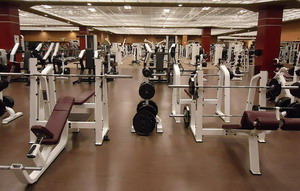 As you can see these types of exercises can easily be done at home with common objects. You can work out your whole body using body weight exercises and isometrics. Going to the gym is not necessary. However, I like the structured environment filled with specialized equipment to make the workout flow more easily. Plus a bonus for those of us of Medicare age, most Medicare plans will pay for your gym membership. So I not only get tons of weight equipment and aerobic equipment, but I also get a steam room, a pool, and a spa.
As you can see these types of exercises can easily be done at home with common objects. You can work out your whole body using body weight exercises and isometrics. Going to the gym is not necessary. However, I like the structured environment filled with specialized equipment to make the workout flow more easily. Plus a bonus for those of us of Medicare age, most Medicare plans will pay for your gym membership. So I not only get tons of weight equipment and aerobic equipment, but I also get a steam room, a pool, and a spa.
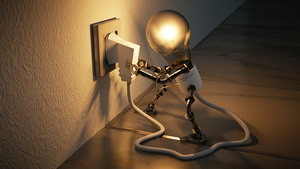 The big message here is that your muscular strength throughout your body hugely affects not only your ability to do just about everything in life, but also directly protects you from chronic disease, poor immune function, and cognitive decline. I would say that this makes the exercise important. Yes, I know that our motivation to get out and move declines as our energy level drops, but getting that exercise is your best way of fighting that energy loss. Your grip strength is an easy window into the health of your whole system. The next time you are in the office ask to check your grip strength to see how well you are doing at keeping aging at bay.
The big message here is that your muscular strength throughout your body hugely affects not only your ability to do just about everything in life, but also directly protects you from chronic disease, poor immune function, and cognitive decline. I would say that this makes the exercise important. Yes, I know that our motivation to get out and move declines as our energy level drops, but getting that exercise is your best way of fighting that energy loss. Your grip strength is an easy window into the health of your whole system. The next time you are in the office ask to check your grip strength to see how well you are doing at keeping aging at bay.
Take care,
David
 Just for fun I bought 30 stress balls to give to patients to encourage them to start working on grip exercises. If you would like one just ask for one at the front desk. Good while supplies last.
Just for fun I bought 30 stress balls to give to patients to encourage them to start working on grip exercises. If you would like one just ask for one at the front desk. Good while supplies last.
 Now Available: Penetrating Relief DMSO liquid – $6
Now Available: Penetrating Relief DMSO liquid – $6
Ellen
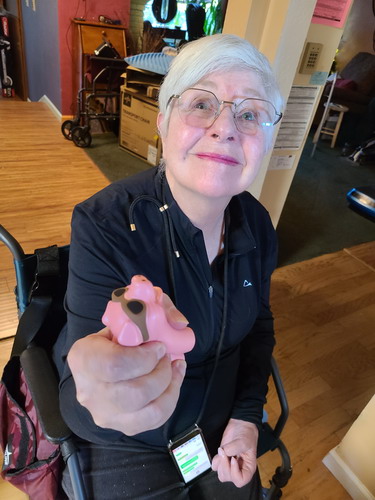 Even Ellen has grip exercises to do. I bought her a stress pig to squeeze to make the process more fun. Her life seems to involve a lot of pigs she wishes could fly, but of course they can’t. Pigs don’t fly. That is why it is so satisfying to squeeze a pretend flying pig.
Even Ellen has grip exercises to do. I bought her a stress pig to squeeze to make the process more fun. Her life seems to involve a lot of pigs she wishes could fly, but of course they can’t. Pigs don’t fly. That is why it is so satisfying to squeeze a pretend flying pig.
 Screen time damages tiny children
Screen time damages tiny children
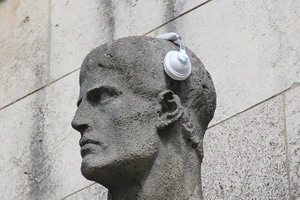 Hearing loss promotes dementia
Hearing loss promotes dementia
 Dairy fats in diet not associated with heart disease or stroke
Dairy fats in diet not associated with heart disease or stroke
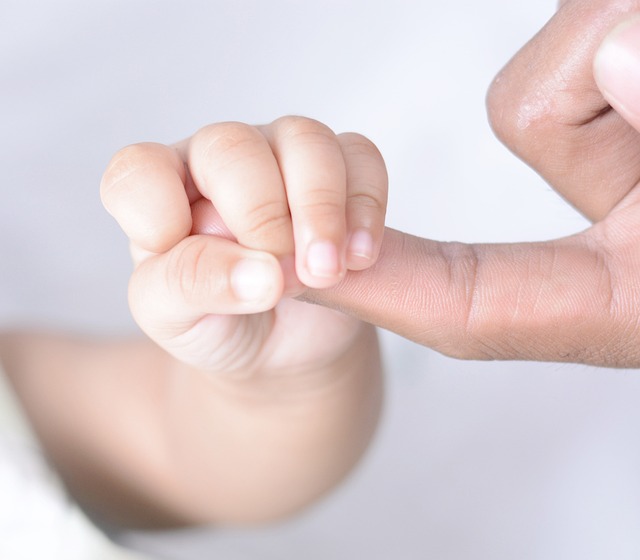
 How is your grip? This is probably something you never think about unless you find you are unable to open a jar of peanut butter anymore. But grip strength is much more than just accessing delicious ground peanuts, a lot more. Your grip strength is an indicator of the strength of the muscles all over your body. It is a simple measure of the general degeneration of all sorts of biological systems as you age. As we age we get weaker. This is inevitable. But slowing the rate of decay is the point of living a healthy lifestyle. So what can we determine from checking our grip strength?
How is your grip? This is probably something you never think about unless you find you are unable to open a jar of peanut butter anymore. But grip strength is much more than just accessing delicious ground peanuts, a lot more. Your grip strength is an indicator of the strength of the muscles all over your body. It is a simple measure of the general degeneration of all sorts of biological systems as you age. As we age we get weaker. This is inevitable. But slowing the rate of decay is the point of living a healthy lifestyle. So what can we determine from checking our grip strength? Okay, how do we measure our grip strength? In the office, I use a tool called a dynamometer. We take the average of three readings to establish your general strength. I also notice how the strength varies between the three readings. If the reading is generally the same or gradually increases then this is normal. But if the reading drops significantly with each squeeze then I suspect a neurological problem. If one side is much weaker than the other then I suspect nerve root issues in the neck on the weak side. If both sides are weak compared to the normals indicated above then I suspect early degenerative changes in the muscles or possibly some metabolic or endocrine problems. As you can see, grip strength decreases as we age, particularly after the age of 50. If you maintain your grip strength, it says you are aging more slowly.
Okay, how do we measure our grip strength? In the office, I use a tool called a dynamometer. We take the average of three readings to establish your general strength. I also notice how the strength varies between the three readings. If the reading is generally the same or gradually increases then this is normal. But if the reading drops significantly with each squeeze then I suspect a neurological problem. If one side is much weaker than the other then I suspect nerve root issues in the neck on the weak side. If both sides are weak compared to the normals indicated above then I suspect early degenerative changes in the muscles or possibly some metabolic or endocrine problems. As you can see, grip strength decreases as we age, particularly after the age of 50. If you maintain your grip strength, it says you are aging more slowly. Why do we get weaker with age? There are several answers to this big question. Nutrition is a simple place to start. As we age, the energy-intense process of making the enzymes and hydrochloric acid our digestion needs to break down proteins into an amino acid form we can absorb becomes less efficient. Our ability to absorb the protein we eat gets less. Consequently, we have to eat more protein as we age to compensate somewhat for this. While a healthy 20 to 40-year-old may get by on only half a gram of protein per pound of body weight, as we get up into our 60s and beyond that number looks more like a whole gram of protein per pound of lean body weight we have. (You don’t count the extra pounds of fat you might be carrying.) Most people do not eat enough protein when they get older. If you are not getting enough protein in your diet then you can’t build muscle, which is made from protein. You can’t build muscle by eating sweets and starches. Salads just won’t cut it.
Why do we get weaker with age? There are several answers to this big question. Nutrition is a simple place to start. As we age, the energy-intense process of making the enzymes and hydrochloric acid our digestion needs to break down proteins into an amino acid form we can absorb becomes less efficient. Our ability to absorb the protein we eat gets less. Consequently, we have to eat more protein as we age to compensate somewhat for this. While a healthy 20 to 40-year-old may get by on only half a gram of protein per pound of body weight, as we get up into our 60s and beyond that number looks more like a whole gram of protein per pound of lean body weight we have. (You don’t count the extra pounds of fat you might be carrying.) Most people do not eat enough protein when they get older. If you are not getting enough protein in your diet then you can’t build muscle, which is made from protein. You can’t build muscle by eating sweets and starches. Salads just won’t cut it. The second big factor is getting the exercise you need. Walking and aerobic exercise are good for the heart, but they do not build much muscle. To signal the body to build muscle, you have to try to make the muscles do more than they can presently do. Simply put that means weight training. You only need to do this 2 or 3 times a week for maybe half an hour, but it must be done. When I go to the gym there are usually half a dozen old codgers like me pumping iron. This includes ladies as well. Working out to my limit poops me out for a couple of hours, so I do this on my days off – Wednesday and Saturday. But many people avoid exercise precisely because it is tiring and our energy level isn’t what it used to be. But the hidden truth is that the way to build more energy is by using up the energy we have. Our bodies are minimum-effort participants. They do the minimum whenever possible. To get them to do more, we have to demand they do more. Giving in to the tiredness gradually makes us more tired.
The second big factor is getting the exercise you need. Walking and aerobic exercise are good for the heart, but they do not build much muscle. To signal the body to build muscle, you have to try to make the muscles do more than they can presently do. Simply put that means weight training. You only need to do this 2 or 3 times a week for maybe half an hour, but it must be done. When I go to the gym there are usually half a dozen old codgers like me pumping iron. This includes ladies as well. Working out to my limit poops me out for a couple of hours, so I do this on my days off – Wednesday and Saturday. But many people avoid exercise precisely because it is tiring and our energy level isn’t what it used to be. But the hidden truth is that the way to build more energy is by using up the energy we have. Our bodies are minimum-effort participants. They do the minimum whenever possible. To get them to do more, we have to demand they do more. Giving in to the tiredness gradually makes us more tired. Poor grip strength is shown in research to indicate poorer immune health. That means you are more vulnerable to getting sick and dying. Your immune system gets old just like the rest of the body. A good supply of muscle mass is vital to a strong immune system. This is the system that not only fights off colds and flu, but cancer and many systemic infectious processes. Lowered immune health also means you are more likely to get complications and do more poorly under care resulting in more hospital time. That muscle mass is also critical to keeping your blood sugar under control. Without that, you are wide open for heart disease, diabetes, and a host of other chronic diseases. Improving grip strength is a well-established way to lower your blood pressure thereby lowering your chance of a stroke.
Poor grip strength is shown in research to indicate poorer immune health. That means you are more vulnerable to getting sick and dying. Your immune system gets old just like the rest of the body. A good supply of muscle mass is vital to a strong immune system. This is the system that not only fights off colds and flu, but cancer and many systemic infectious processes. Lowered immune health also means you are more likely to get complications and do more poorly under care resulting in more hospital time. That muscle mass is also critical to keeping your blood sugar under control. Without that, you are wide open for heart disease, diabetes, and a host of other chronic diseases. Improving grip strength is a well-established way to lower your blood pressure thereby lowering your chance of a stroke. Along those same lines, lower grip strength is associated with poorer cognitive health, sleeping trouble, and depression. Your grip is a simple indicator of how quickly your body is aging. No one wants to hear it, but your golden years are not simply a time to kick back and relax. In life, you are either hiking up the hill or sliding down the hill. The instant you stop to relax for more than a day or two you start sliding down the hill. Muscle movements and strength challenges are vital nutrients for the body just like food and water. We have heard it a thousand times – Use it or lose it. However, the research with grip strength shows us just how widespread this maxim is in the body.
Along those same lines, lower grip strength is associated with poorer cognitive health, sleeping trouble, and depression. Your grip is a simple indicator of how quickly your body is aging. No one wants to hear it, but your golden years are not simply a time to kick back and relax. In life, you are either hiking up the hill or sliding down the hill. The instant you stop to relax for more than a day or two you start sliding down the hill. Muscle movements and strength challenges are vital nutrients for the body just like food and water. We have heard it a thousand times – Use it or lose it. However, the research with grip strength shows us just how widespread this maxim is in the body. Okay, so how can we improve your grip strength if yours is not up to snuff? Let me emphasize that grip strength is a proxy for all the muscles in your body, and improving just your grip is not going to help all of them. You need to work the whole body. This point seems to be missed in the online blogs about grip strength. So grip strength – twist, squeeze, pinch, and hold are the four main techniques used to pump up your grip.Twist – get a small towel or washcloth wet and twist the heck out of it to squeeze out all the water you can.
Okay, so how can we improve your grip strength if yours is not up to snuff? Let me emphasize that grip strength is a proxy for all the muscles in your body, and improving just your grip is not going to help all of them. You need to work the whole body. This point seems to be missed in the online blogs about grip strength. So grip strength – twist, squeeze, pinch, and hold are the four main techniques used to pump up your grip.Twist – get a small towel or washcloth wet and twist the heck out of it to squeeze out all the water you can. As you can see these types of exercises can easily be done at home with common objects. You can work out your whole body using body weight exercises and isometrics. Going to the gym is not necessary. However, I like the structured environment filled with specialized equipment to make the workout flow more easily. Plus a bonus for those of us of Medicare age, most Medicare plans will pay for your gym membership. So I not only get tons of weight equipment and aerobic equipment, but I also get a steam room, a pool, and a spa.
As you can see these types of exercises can easily be done at home with common objects. You can work out your whole body using body weight exercises and isometrics. Going to the gym is not necessary. However, I like the structured environment filled with specialized equipment to make the workout flow more easily. Plus a bonus for those of us of Medicare age, most Medicare plans will pay for your gym membership. So I not only get tons of weight equipment and aerobic equipment, but I also get a steam room, a pool, and a spa. The big message here is that your muscular strength throughout your body hugely affects not only your ability to do just about everything in life, but also directly protects you from chronic disease, poor immune function, and cognitive decline. I would say that this makes the exercise important. Yes, I know that our motivation to get out and move declines as our energy level drops, but getting that exercise is your best way of fighting that energy loss. Your grip strength is an easy window into the health of your whole system. The next time you are in the office ask to check your grip strength to see how well you are doing at keeping aging at bay.
The big message here is that your muscular strength throughout your body hugely affects not only your ability to do just about everything in life, but also directly protects you from chronic disease, poor immune function, and cognitive decline. I would say that this makes the exercise important. Yes, I know that our motivation to get out and move declines as our energy level drops, but getting that exercise is your best way of fighting that energy loss. Your grip strength is an easy window into the health of your whole system. The next time you are in the office ask to check your grip strength to see how well you are doing at keeping aging at bay. Just for fun I bought 30 stress balls to give to patients to encourage them to start working on grip exercises. If you would like one just ask for one at the front desk. Good while supplies last.
Just for fun I bought 30 stress balls to give to patients to encourage them to start working on grip exercises. If you would like one just ask for one at the front desk. Good while supplies last. Now Available: Penetrating Relief DMSO liquid – $6
Now Available: Penetrating Relief DMSO liquid – $6 Even Ellen has grip exercises to do. I bought her a stress pig to squeeze to make the process more fun. Her life seems to involve a lot of pigs she wishes could fly, but of course they can’t. Pigs don’t fly. That is why it is so satisfying to squeeze a pretend flying pig.
Even Ellen has grip exercises to do. I bought her a stress pig to squeeze to make the process more fun. Her life seems to involve a lot of pigs she wishes could fly, but of course they can’t. Pigs don’t fly. That is why it is so satisfying to squeeze a pretend flying pig.